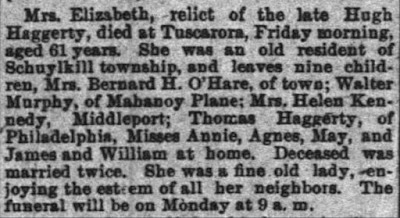 |
| Cullen, Elizabeth Pottsville Republican 2 Aug 1890, page 4 |
It was quite normal in the 19th century to refer to a widow as a relict. There are two definitions here and I only knew the one that referred to old museum pieces before stumbling onto this clipping. The other reference is old lady, which I heard growing up from most every married male adult in reference to his wife. And until I grew up, never gave it a thought as derogatory. As it's used in this obit blurb, it sounds more endearing than the point I'm making.
Speaking of wives, the majority of the time newspapers referred to a married woman as part of the couple Mr. and Mrs. John Q. Doe or just Mrs. John Q. Doe rather than Mrs. Jane Doe. This makes your married female ancestor a challenge to locate in newspapers without some additional facts to confirm her identity. Single women, and sometimes widows, were referred to by their given first name and current surname.
I came across an article about an unfortunate death of an elderly mother and her daughter, caught in a kitchen fire, being described as bodies burned brown and burned to a crust or a crisp as if they were an inanimate object. I cannot imagine that write-up in today's papers let alone reading it about my own family member. It's too sensitive a subject to include an image here.
Then there is this humorous clipping, and I say that in light of the fact that the editor approved the reporters words verbatim. Seeing the response of the immigrant in print made me cringe a bit as if it had been in a newspaper today, but I will not lie and say I didn't laugh at his response to the dilemma.
 |
| The Herald-Journal Bessemer, Alabama 01 Mar 1906 Thu, page 2 |


